-
Countries
-
Data and Analysis
-
Special Focus
-
Crisis Responses
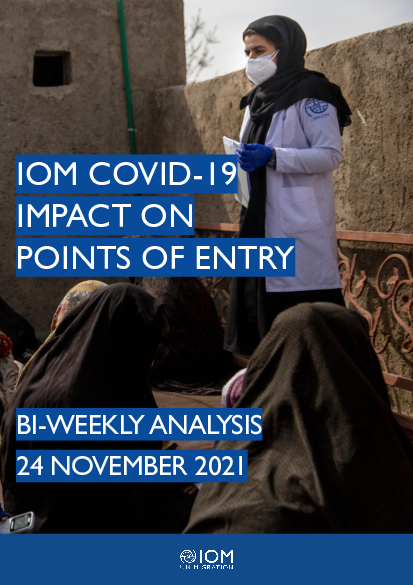
Contact
dtmcovid19@iom.int
Language
English
Location
Global
Period Covered
Mar 13 2020
Nov 18 2021
Activity
- Mobility Tracking
- Points of Entry (PoE)
IOM COVID-19 Impact on Points of Entry Bi-Weekly Analysis is meant to serve IOM Member States, IOM, UN and voluntary partner agencies, the civil society (including media) as well as the general population in analysing the impact of COVID-19 pandemic on Points of Entry. It is particularly relevant when identifying and addressing specific needs faced by migrants and mobile populations, disproportionately affected by global mobility restrictions. The report is based on information provided by IOM field staff, using resources available at the IOM country office level and is accurate to the best of IOM’s knowledge at the time of compilation. All information is being constantly validated, including the geolocation and attributes, and through regular assessments and triangulation of information. The updates depend on the time frame within which the information becomes available and is processed by IOM. For this reason, the analysis is always dated and timestamped in order to reflect reality at a given time. However, as the situation continuously evolves and changes, despite IOM’s best efforts, the analysis may not always accurately reflect the multiple and simultaneous restrictive measures being imposed at a specific location.
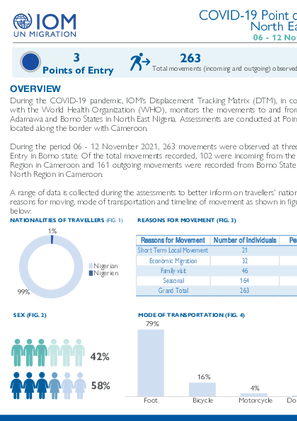
Contact
DTM Nigeria, AllUsersInDTMNigeria@iom.int
Language
English
Location
Nigeria
Period Covered
Nov 06 2021
Nov 12 2021
Activity
- Flow Monitoring
- Mobility Tracking
- Points of Entry (PoE)
During the COVID-19 pandemic, IOM's Displacement Tracking Matrix (DTM), in collaboration with the World Health Organization (WHO), monitors the movements to and from Nigeria's Adamawa and Borno States in North East Nigeria. Assessments are conducted at Points of Entry located along the border with Cameroon.
During the period 06 - 12 November 2021, 263 movements were observed at three Points of Entry in Borno state. Of the total movements recorded, 102 were incoming from the Far North Region in Cameroon and 161 outgoing movements were recorded from Borno State to the Far North Region in Cameroon. In addition, a range of data is collected during the assessments to better inform on travellers’ nationalities, sex, reasons for moving, mode of transportation and timeline of movements.
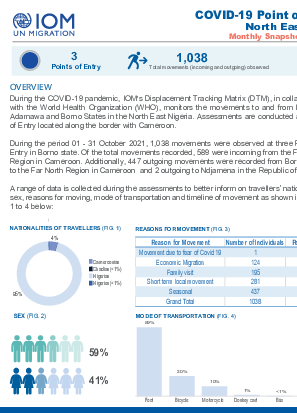
Contact
DTM Nigeria, AllUsersInDTMNigeria@iom.int
Language
English
Location
Nigeria
Period Covered
Oct 01 2021
Oct 31 2021
Activity
- Flow Monitoring
- Mobility Tracking
- Points of Entry (PoE)
During the COVID-19 pandemic, IOM's Displacement Tracking Matrix (DTM), in collaboration with the World Health Organization (WHO), monitors the movements to and from Nigeria's Adamawa and Borno States in the North East Nigeria. Assessments are conducted at Points of Entry located along the border with Cameroon.
During the period 01 - 31 October 2021, 1,038 movements were observed at three Points of Entry in Borno state. Of the total movements recorded, 589 were incoming from the Far North Region in Cameroon. Additionally, 447 outgoing movements were recorded from Borno State to the Far North Region in Cameroon and 2 outgoing to Ndjamena in the Republic of Chad. In addition, a range of data is collected during the assessments to better inform on travellers’ nationalities, sex, reasons for moving, mode of transportation and timeline of movements
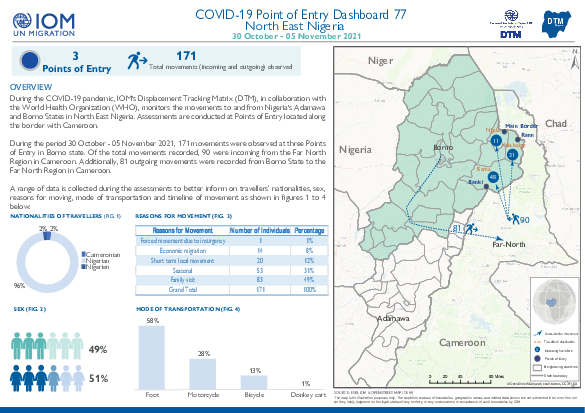
Contact
DTM Nigeria, AllUsersInDTMNigeria@iom.int
Language
English
Location
Nigeria
Period Covered
Oct 30 2021
Nov 05 2021
Activity
- Flow Monitoring
- Mobility Tracking
- Points of Entry (PoE)
During the COVID-19 pandemic, IOM's Displacement Tracking Matrix (DTM), in collaboration with the World Health Organization (WHO), monitors the movements to and from Nigeria's Adamawa and Borno States in North East Nigeria. Assessments are conducted at Points of Entry located along the border with Cameroon.
During the period 30 October - 05 November 2021, 171 movements were observed at three Points of Entry in Borno state. Of the total movements recorded, 90 were incoming from the Far North Region in Cameroon. Additionally, 81 outgoing movements were recorded from Borno State to the Far North Region in Cameroon. In addition, a range of data is collected during the assessments to better inform on travellers’ nationalities, sex, reasons for moving, mode of transportation and timeline of movements
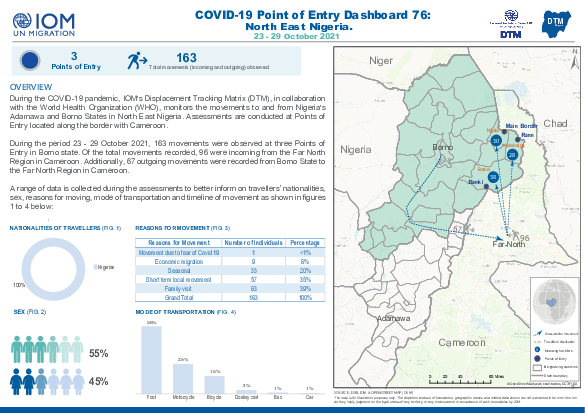
Contact
DTM Nigeria, AllUsersInDTMNigeria@iom.int
Language
English
Location
Nigeria
Period Covered
Oct 23 2021
Oct 29 2021
Activity
- Flow Monitoring
- Mobility Tracking
- Points of Entry (PoE)
During the COVID-19 pandemic, IOM's Displacement Tracking Matrix (DTM), in collaboration with the World Health Organization (WHO), monitors the movements to and from Nigeria's Adamawa and Borno States in North East Nigeria. Assessments are conducted at Points of Entry located along the border with Cameroon.
During the period 23 - 29 October 2021, 163 movements were observed at three Points of Entry in Borno state. Of the total movements recorded, 96 were incoming from the Far North Region in Cameroon. Additionally, 67 outgoing movements were recorded from Borno State to the Far North Region in Cameroon. In addition, a range of data is collected during the assessments to better inform on travellers’ nationalities, sex, reasons for moving, mode of transportation and timeline of movement.
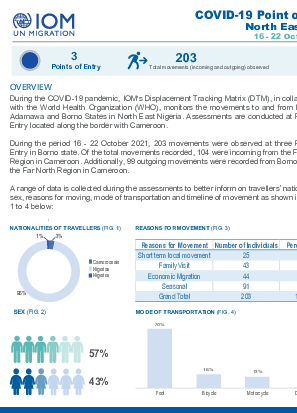
Contact
DTM Nigeria, AllUsersInDTMNigeria@iom.int
Language
English
Location
Nigeria
Period Covered
Oct 16 2021
Oct 22 2021
Activity
- Flow Monitoring
- Mobility Tracking
- Points of Entry (PoE)
During the COVID-19 pandemic, IOM's Displacement Tracking Matrix (DTM), in collaboration with the World Health Organization (WHO), monitors the movements to and from Nigeria's Adamawa and Borno States in North East Nigeria. Assessments are conducted at Points of Entry located along the border with Cameroon.
During the period 16 - 22 October 2021, 203 movements were observed at three Points of Entry in Borno state. Of the total movements recorded, 104 were incoming from the Far North Region in Cameroon. Additionally, 99 outgoing movements were recorded from Borno State to the Far North Region in Cameroon.
In addition, a range of data is collected during the assessments to better inform on travellers’ nationalities, sex, reasons for moving, mode of transportation and timeline of movements.
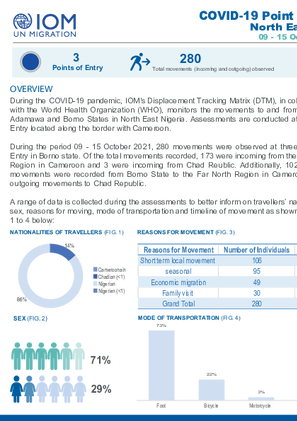
Contact
DTM Nigeria, AllUsersInDTMNigeria@iom.int
Language
English
Location
Nigeria
Period Covered
Oct 09 2021
Nov 15 2021
Activity
- Flow Monitoring
- Mobility Tracking
- Points of Entry (PoE)
During the COVID-19 pandemic, IOM's Displacement Tracking Matrix (DTM), in collaboration with the World Health Organization (WHO), monitors the movements to and from Nigeria's Adamawa and Borno States in North East Nigeria. Assessments are conducted at Points of Entry located along the border with Cameroon.
During the period 09 - 15 October 2021, 280 movements were observed at three Points of Entry in Borno state. Of the total movements recorded, 173 were incoming from the Far North Region in Cameroon and 3 were incoming from Chad Reublic. Additionally, 102 outgoing movements were recorded from Borno State to the Far North Region in Cameroon and 2 outgoing movements to Chad Republic. In addition, a range of data is collected during the assessments to better inform on travellers’ nationalities, sex, reasons for moving, mode of transportation and timeline of movements.
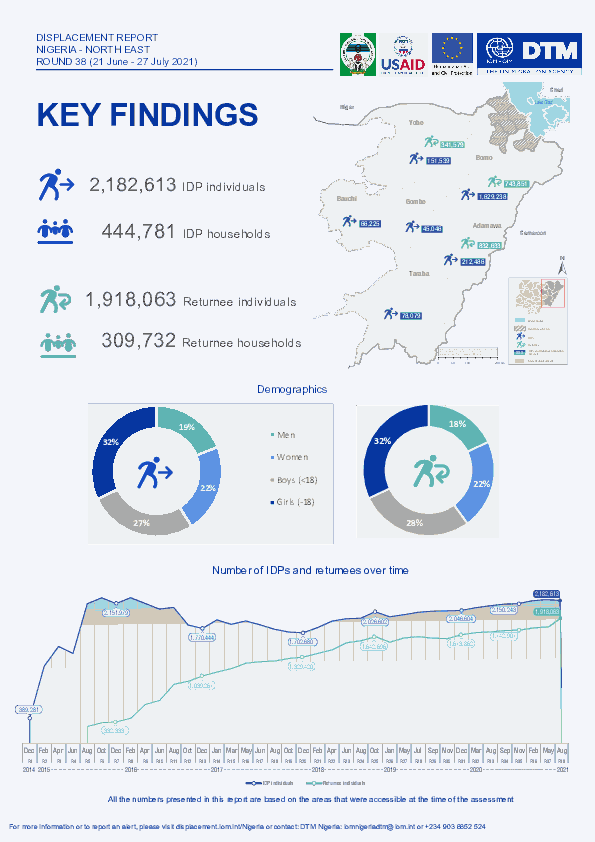
Contact
DTM Nigeria, AllUsersInDTMNigeria@iom.int
Language
English
Location
Nigeria
Period Covered
Jun 21 2021
Jul 27 2021
Activity
- Mobility Tracking
- Baseline Assessment
This factsheet presents key findings from covers the period from 21 June to 27 July 2021, which presents the results from the Round 38 of Displacement Tracking Matrix (DTM) assessments carried out by the International Organization for Migration (IOM) in North East Zone. The information collected seeks to inform the government of Nigeria — as well as the humanitarian community — with an improved understanding of population movement and displacement. Likewise, it aims to better inform the humanitarian response and relief provision for the affected populations.
During Round 38, DTM identified 2,182,613 IDPs (444,781 households) as well as 1,918,063 Returnees (309,732 households).
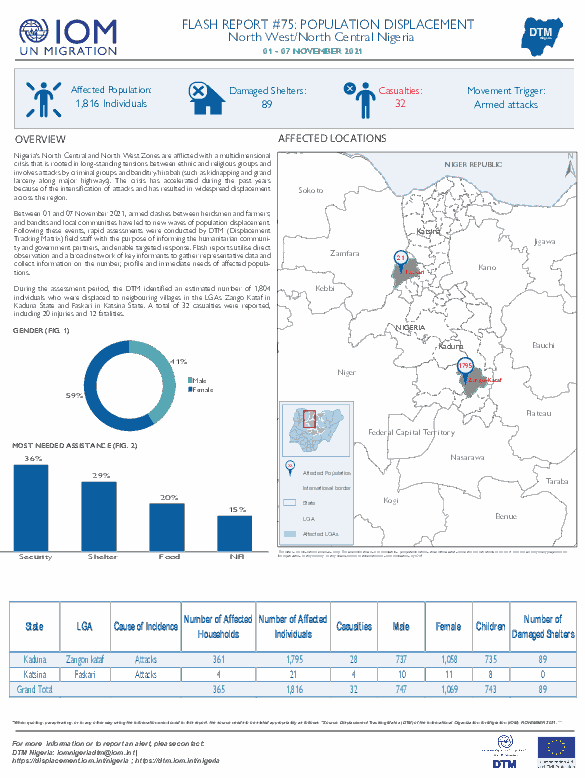
Contact
DTM Nigeria, AllUsersInDTMNigeria@iom.int
Language
English
Location
Nigeria
Period Covered
Nov 01 2021
Nov 07 2021
Activity
- Event Tracking
- Mobility Tracking
Nigeria's North Central and North West Zones are afflicted with a multidimensional crisis that is rooted in long-standing tensions between ethnic and religious groups and involves attacks by criminal groups and banditry/hirabah (such as kidnapping and grand
larceny along major highways). The crisis has accelerated during the past years because of the intensification of attacks and has resulted in widespread displacement across the region.
Between 01 and 07 November 2021, armed clashes between herdsmen and farmers; and bandits and local communities have led to new waves of population displacement. Following these events, rapid assessments were conducted by DTM (Displacement
Tracking Matrix) field staff with the purpose of informing the humanitarian community and government partners, and enable targeted response. Flash reports utilise direct observation and a broad network of key informants to gather representative data and collect information on the number, profile and immediate needs of affected populations. During the assessment period, the DTM identified an estimated number of 1,804 individuals who were displaced to neigbouring villages in the LGAs Zango Kataf in
Kaduna State and Faskari in Katsina State. A total of 32 casualties were reported, including 20 injuries and 12 fatalities.
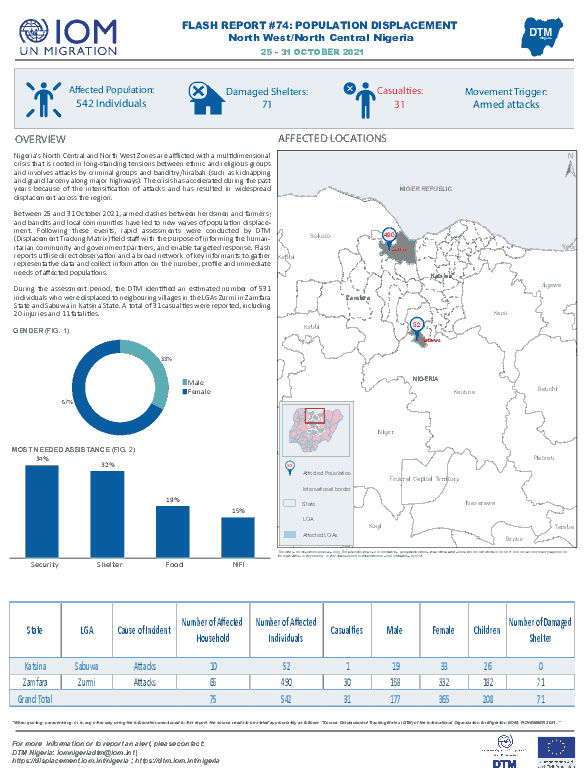
Contact
DTM Nigeria, AllUsersInDTMNigeria@iom.int
Language
English
Location
Nigeria
Period Covered
Oct 25 2021
Oct 31 2021
Activity
- Event Tracking
- Mobility Tracking
Nigeria's North Central and North West Zones are afflicted with a multidimensional crisis that is rooted in long-standing tensions between ethnic and religious groups and involves attacks by criminal groups and banditry/hirabah (such as kidnapping and grand larceny along major highways). The crisis has accelerated during the past years because of the intensification of attacks and has resulted in widespread displacement across the region. Between 25 and 31 October 2021, armed clashes between herdsmen and farmers; and bandits and local communities have led to new waves of population displacement. Following these events, rapid assessments were conducted by DTM (Displacement Tracking Matrix) field staff with the purpose of informing the humanitarian community and government partners, and enable targeted response. Flash reports utilise direct observation and a broad network of key informants to gather representative data and collect information on the number, profile and immediate needs of affected populations. During the assessment period, the DTM identified an estimated number of 531 individuals who were displaced to neigbouring villages in the LGAs Zurmi in Zamfara State and Sabuwa in Katsina.
